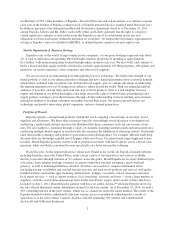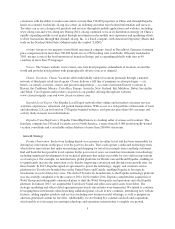Expedia 2014 Annual Report Download - page 16
Download and view the complete annual report
Please find page 16 of the 2014 Expedia annual report below. You can navigate through the pages in the report by either clicking on the pages listed below, or by using the keyword search tool below to find specific information within the annual report.Online and traditional travel agencies: We face increasing competition from other online travel agencies
(“OTAs”) in many regions, such as The Priceline Group and its subsidiaries Booking.com and Agoda.com,
Orbitz, and regional competitors such as Ctrip, which in some cases may have more favorable offerings for
travelers or suppliers, including pricing and supply breadth. We also compete with traditional travel agencies,
wholesalers and tour operators for both travelers and the acquisition and retention of supply.
Travel suppliers: Some of our competitors, including travel suppliers such as airlines and hotels, may offer
products and services on more favorable terms, including lower prices, no fees or unique access to proprietary
loyalty programs, such as points and miles. Many of these competitors, such as airlines, hotel and rental car
companies, have been steadily focusing on increasing online demand on their own websites and mobile
applications in lieu of third-party distributors such as the various Expedia sites. For instance, some low cost
airlines, which are having increasing success in the marketplace, distribute their online supply exclusively
through their own websites and several large hotel chains have combined to establish a single online hotels
search platform with links directly to their own websites and mobile applications. Suppliers who sell on their
own websites, in some instances, offer advantages such as increased or exclusive product availability,
complimentary Wi-Fi, and their own bonus miles or loyalty points, which could make their offerings more
attractive to consumers than ours.
Search engines: We also face increasing competition from search engines including Google, Bing and
Yahoo! Search. To the extent that these leading search engines that have a significant presence in our key
markets disintermediate online travel agencies or travel content providers by offering comprehensive travel
planning, shopping or booking capabilities, or increasingly refer those leads directly to suppliers or other favored
partners, increase the cost of traffic directed to our websites, or offer the ability to transact on their own website,
there could be a material adverse impact on our business and financial performance. For example, in recent years
search engines have increased their focus on acquiring or launching flight and hotel search products that provide
increasingly comprehensive travel planning content, comparable to OTAs. To the extent these actions have a
negative effect on our search traffic or the cost of acquiring such traffic, our business and financial performance
could be adversely affected.
In addition, our websites, or websites in which we hold a significant ownership position, including trivago-
branded websites, compete for advertising revenue with these search engines, as well as with large internet portal
sites that offer advertising opportunities for travel-related companies. Several of these competitors have
significantly greater financial, technical, marketing and other resources and large client bases than us. We expect
to face additional competition as other established and emerging companies enter the online advertising market.
Competition could result in higher traffic acquisitions costs, reduced margins on our advertising services, loss of
market share, reduced customer traffic to our websites and reduced advertising by travel companies on our
websites.
Travel metasearch engines: Travel metasearch websites, including Kayak.com (a subsidiary of Priceline),
trivago (a majority-owned subsidiary of Expedia), TripAdvisor, and Qunar (a subsidiary of Baidu), aggregate
travel search results for a specific itinerary across supplier, travel agent and other websites. In addition, some
metasearch sites have added or intend to add various forms of direct or assisted booking functionality to their
sites in direct competition with certain of our brands. To the extent metasearch websites limit our participation
within their search results, or consumers utilize the metasearch website for travel services and bookings instead
of ours, our traffic-generating arrangements could be affected in a negative manner, or we may be required to
increase our marketing costs to maintain market share, either of which could have an adverse effect on our
business and results of operations. In addition, as a result of our acquisition of a majority ownership interest in
trivago, we also now compete more directly with other metasearch engines and content aggregators for
advertising revenue. To the extent that trivago’s ability to aggregate travel search results for a specific itinerary
across supplier, travel agent and other websites is hampered, whether due to its affiliation with us or otherwise,
trivago’s business and results of operations could be adversely affected and the value of our investment in trivago
could be negatively impacted.
12
























